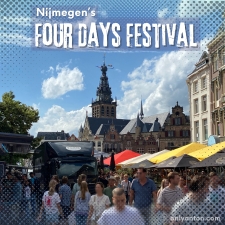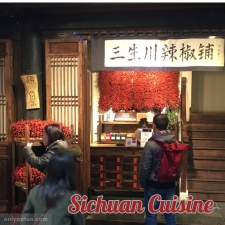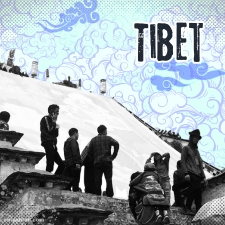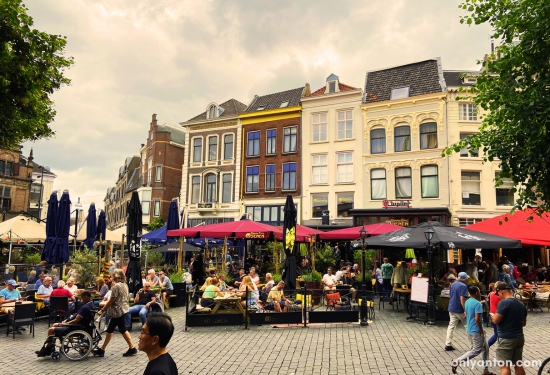
Introduction
The streets of Nijmegen, the oldest city in the Netherlands, are transformed into more than a vibrant panoply of music, laughter, and collective joy during the Four Days Festival. They become a living testament to the power of community. Thousands of people from all walks of life come together in a grand celebration that transcends boundaries and unites in the spirit of festivity. This is not just any event. In Dutch, this is the Vierdaagsefeest. Sometimes, it is known as the Four Days March Festival. By whatever name, it is a time-honoured tradition that marks the pinnacle of summer in this historic city.
My initial motivation for travelling to Nijmegen in 2023 was a desire to learn more about its rich history. Of particular interest to me was the little-known Limbourg Brothers Museum. I had booked a hotel right downtown, near the Valkhof, expecting a quiet exploration of this ancient city. However, I was in for a delightful surprise. My visit had coincided with the Four Days Festival. I encountered a city alive with energy and warmth that took me completely by surprise. It was as if Nijmegen had opened its arms and invited me to join in its most joyous celebration.
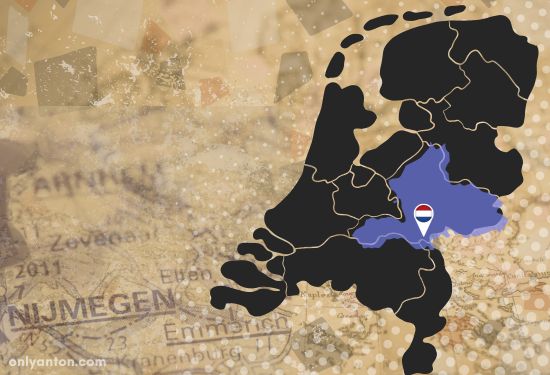
Location
Nijmegen is the largest city in the eastern province of Gelderland and the tenth largest city in the Netherlands. Nestled on the banks of the Waal River, it is a city that traces its roots back to Roman times. Ancient architecture and modern vibrancy coexist, offering a unique blend of cultural experiences. Each year, Nijmegen comes alive with the Four Days Festival. It is an event that goes beyond a mere walking challenge. It has become a week-long extravaganza of music, dance, and camaraderie.
The Four Days Festival is not just a test of endurance. It’s a vibrant celebration of life, community, and the enduring spirit of Nijmegen. As we delve into the heart of this remarkable event, we’ll explore its rich history, the music that fills the nights with a pulsating rhythm, and the culinary delights that tempt the taste buds. I will also share some insider tips to help you make the most of this unforgettable experience. Join me on this journey through the streets of Nijmegen, where every step is a story and every moment is a memory waiting to be made.
Nijmegen: A City Steeped in History
Nijmegen is the oldest city in the Netherlands, with roots that reach back over two millennia. Its origins can be traced to the Roman era, around 12 BCE, when it was established as a military camp named Ulpia Noviomagus Batavorum. Over the centuries, Nijmegen has witnessed the ebb and flow of history, from the rise and fall of empires to the tumult of wars and the progress of peace.
The Valkhof
One of the city’s most significant historical landmarks is the Valkhof, a hill that was once the site of a Roman camp and later a Carolingian palace. It is likely that Charlemagne, the first Holy Roman Emperor, who was instrumental in influencing Europe’s early medieval history, paid a visit to this palace. Today, the Valkhof is home to the Valkhof Museum. It houses a collection of Roman artifacts and medieval art that offers a glimpse into the city’s storied past. The nearby Valkhof Park maintains remnants of a medieval castle and the ruins of a Carolingian chapel and is normally a serene spot that overlooks the Waal River. The park provides a picturesque link between Nijmegen’s history and natural beauty.
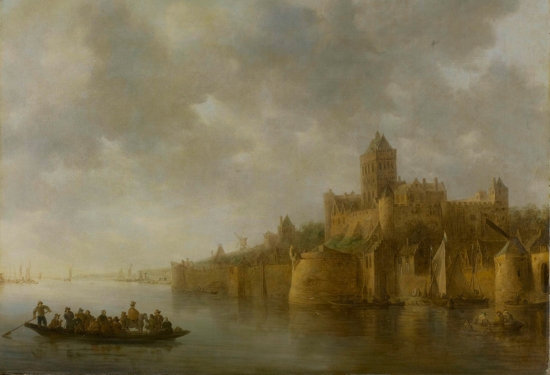
The Waal River
Nijmegen’s strategic location on the Waal River, a major branch of the Rhine, has played a crucial role in its development and significance in the Netherlands. It has been a vital center for trade and commerce, contributing to the region’s economic growth. The city’s proximity to the German border has also made it a key player in cross-border relations and cultural exchanges.
Cultural Centre
Over the years, Nijmegen has embraced its lineage while evolving into a vibrant cultural hub. It is renowned for its lively arts scene. There are numerous theatres, galleries, and music venues that host various events and festivals throughout the year. The city’s universities and research institutions add to its dynamic atmosphere, attracting students and scholars from around the world.
The annual celebrations in Nijmegen serve to further highlight its significance in local culture and events. The Four Days Festival, for example, draws visitors from across the globe. This event, along with others like the International Music Meeting Festival and the Nijmegen Wintertuin Literary Festival, showcases the city’s commitment to fostering cultural diversity and artistic expression.
In summary, Nijmegen is a city that honors its past while embracing the present. Its Roman origins, historical landmarks, and vibrant cultural scene make it an important and fascinating destination in the Netherlands, offering a unique blend of history, nature, and creativity.
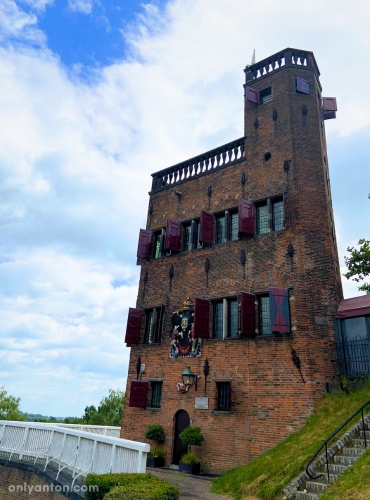
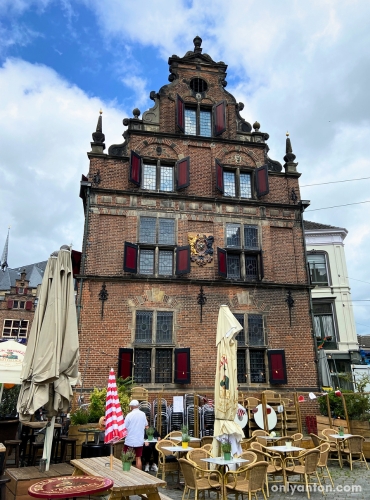
The Four Days Festival (Vierdaagsefeest)
History of the Festival
The Four Days Festival, known in Dutch as the Vierdaagsefeest, is a remarkable event that has put Nijmegen on the map as a city of endurance, festivity, and international camaraderie. At its core, the festival is centred around the International Four Days Marches Nijmegen, a prestigious walking event that dates back to 1909. Originally conceived as a military exercise to increase the physical fitness of soldiers, the event quickly gained popularity among civilians and evolved into a much-anticipated annual celebration.
The festival’s history is a testament to its growing appeal and the enduring spirit of its participants. What started as a modest gathering of a few hundred walkers has transformed into the world’s largest multiple-day walking event, attracting over 40,000 participants from more than 70 countries. The marchers traverse the scenic landscapes of the Nijmegen region in a display of resilience and determination.
A significant highlight for participants is the opportunity to earn the Cross of the Four Days Marches (Kruis voor Betoonde Marsvaardigheid). It is a prestigious medal awarded to those who successfully complete the event. This bronze cross, adorned with the Dutch royal crown and the inscription “Vierdaagse Nijmegen,” is a symbol of achievement and perseverance. Walkers cherish it as a tangible representation of their journey.
Festival Details
The four-day event is typically held in the third week of July. For 2024, the march will take place from July 16 to 19. Different distances can accommodate various age groups and fitness levels. Participants can choose to walk 30, 40, or 50 kilometres per day, depending on their age and gender. The goal is to complete the chosen distance each day, culminating in a grand total of 120, 160, or 200 kilometres walked by the end of the event.
The Four Days Festival has extended beyond the walking challenge. Nowadays, it envelops the entire city in a week-long celebration. The music festival for 2024 will last from July 13 to 19. Streets come alive with music, dance, and cultural activities, creating a festive atmosphere that captivates both participants and spectators. During this time, the city’s population nearly doubles. Visitors from around the globe flock to Nijmegen to partake in the jubilant spirit of the festival. The Four Days Festival is not just a test of physical endurance. It’s a celebration of unity, diversity, and the human spirit. Its origins as a military exercise have given way to a global phenomenon that brings people together in a shared journey of resilience and joy. The festival’s offerings, moreover, include music, food, and cultural experiences that make this event a highlight of Nijmegen’s summer calendar.
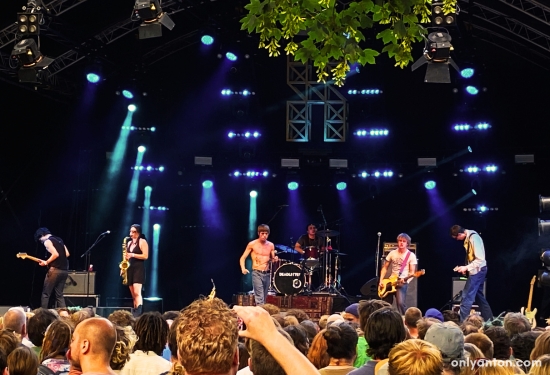
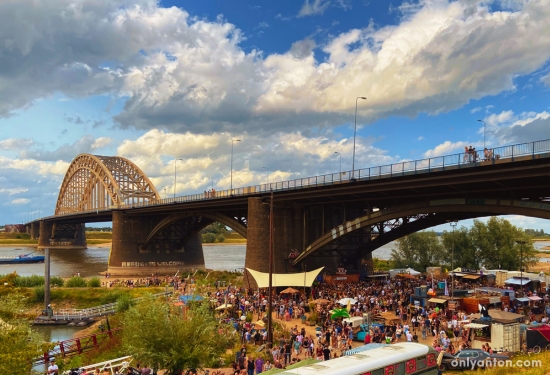
The Music Festival: A Symphony of Sounds
While the Four Days Marches test the limits of physical endurance, the accompanying music festival sets the rhythm for a week-long celebration of culture and camaraderie. As the sun sets on the walking trails, the city of Nijmegen transforms into a vibrant stage for musical performances. Both participants and spectators engage in a shared experience of joy and entertainment.
Venues and Variety
The music festival takes place across various locations in Nijmegen, from the bustling squares in the city center to the more intimate settings along the Waal River. With over 40 venues scattered throughout the city, the festival offers a diverse array of musical genres to suit every taste. From rock and pop to jazz and electronic, the sounds of the festival are as varied as the walkers themselves.
Popular Acts and Unique Performances
Each year, the festival lineup features a mix of well-known artists and emerging talents, ensuring a fresh and exciting experience for attendees. Popular acts often include Dutch and international bands. Unique performances may range from local folk groups to experimental DJs. The festival is also a platform for showcasing the rich musical heritage of the region, with performances by traditional ensembles and singer-songwriters.
Atmosphere and Experience
The atmosphere of the music festival is one of celebration and unity. Streets and squares come alive with the energy of live music, creating a lively backdrop for the festivities. Outdoor stages and pop-up venues add to the dynamic nature of the event. Festival-goers can wander from one performance to another, discovering new sounds and making new friends along the way.
As the music fills the air, the festival becomes a melting pot of cultures and generations. People of all ages come together to dance, sing, and revel in the shared joy of the moment. It’s an experience that transcends the physical challenges of the day, lifting spirits and strengthening bonds within the community.
The music festival is not only a feast for the ears but also a catalyst for culinary exploration. Food and drink fuel the festivities with flavours that add another layer of richness to this extraordinary event.
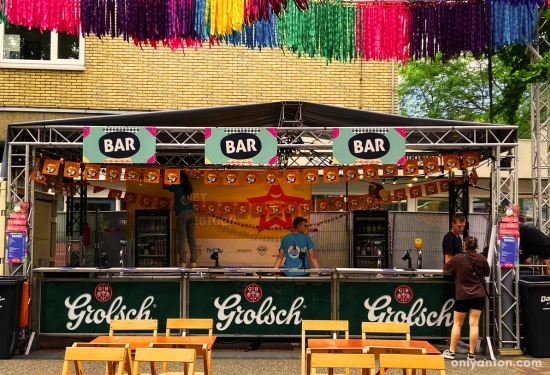
Culinary Delights and Refreshments
As the music reverberates through the streets of Nijmegen, the festival also becomes a showcase for an array of culinary delights. From local Dutch specialties to international flavours, the Four Days Festival offers a gastronomic journey that complements the vibrant atmosphere of the event.
Local Cuisine and International Flavours
The festival is an excellent opportunity to sample traditional Dutch cuisine. Examples include bitterballen (deep-fried meatballs), stroopwafels (syrup waffles), oliebollen (Dutch doughnuts), pannenkoeken (Dutch pancakes), and poffertjes (mini pancakes). Alongside these local favourites, food stalls and pop-up kitchens serve a variety of international dishes, ensuring there’s something to satisfy every palate.
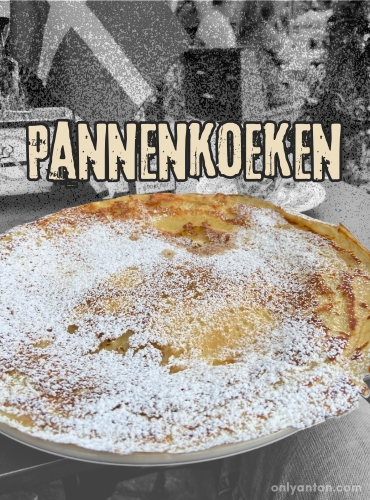
Must-Try Dishes and Popular Stalls
- Broodje Haring: Don’t miss the chance to try this Dutch classic—a herring sandwich served with onions and pickles.
- Indonesian Satay: For a taste of the Netherlands’ colonial past, seek out stalls offering deliciously marinated and grilled Indonesian satay skewers.
- Food Trucks: Look for food trucks serving gourmet burgers, artisanal pizzas, and other trendy street food options.
Tips for Food and Drink
- Explore Different Areas: The festival’s food offerings are spread across the city. Venture beyond the main squares to discover hidden gems and less crowded spots.
- Stay Hydrated: With all the walking and dancing, it’s essential to stay hydrated. Look for stalls selling fresh fruit juices or grab a bottle of water.
- Enjoy Responsibly: While it’s tempting to indulge in the array of beers and wines available, remember to enjoy these beverages responsibly, especially if you’re participating in the walks.
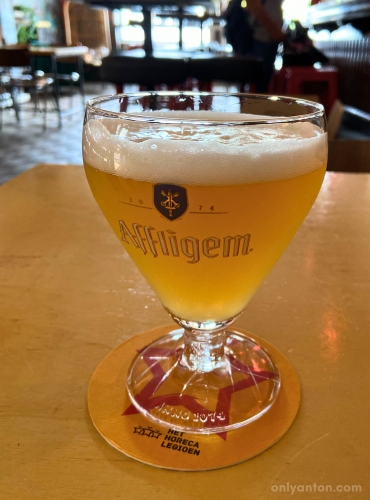
In summary, the Four Days Festival in Nijmegen is not just a feast for the senses but also a celebration of flavours. Whether you’re refuelling after a long day of walking or simply soaking in the festive atmosphere, the culinary offerings of the event are sure to leave a lasting impression.
Navigating the Festival: Tips for Attendees
Attending the Four Days Festival in Nijmegen is an unforgettable experience. Nonetheless, a little planning can go a long way in ensuring a smooth and enjoyable visit. Here are some practical tips for attendees:
What to Do and Where to Stay
- Explore the Program: The festival offers a wide range of activities beyond the walks and music. Check the official festival program for special events, cultural performances, and family-friendly activities.
- Accommodation: Nijmegen has a variety of accommodation options, from hotels and hostels to campsites and Airbnb rentals. For a unique experience, consider staying in nearby villages or countryside B&Bs.
Reserving Hotel Rooms
- Book Early: Due to the festival’s popularity, hotel rooms and other accommodations in and around Nijmegen fill up quickly. It’s advisable to book your stay several months in advance to secure your preferred lodging.
Making the Most of the Festival Experience
- Pace Yourself: With so much to see and do, it’s important to pace yourself. Take breaks, stay hydrated, and don’t try to cram too much into one day.
- Meet the Locals: The festival is a great opportunity to interact with locals and learn more about Dutch culture. Don’t hesitate to strike up a conversation with fellow attendees or residents.
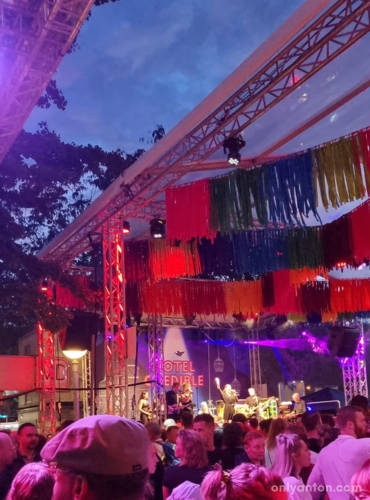
Safety Tips
- Stay Informed: Keep an eye on your belongings. The Netherlands is generally safe, but common sense dictates that you be aware of your surroundings, especially in crowded areas.
- Be prepared for the weather. Dutch summers can vary from cool and rainy to hot and sunny. Ensure you have rain or sun protection as needed.
- Emergency Services: Familiarize yourself with the location of first aid stations and emergency services. Keep a list of important contact numbers handy.
Transportation Options
- Public Transport: Nijmegen is well-connected by trains and buses. Consider using public transport to avoid traffic and parking hassles.
- Biking: Renting a bike is a great way to explore Nijmegen and its surroundings. Many accommodations offer bike rental services.
- Festival Shuttles: Look out for special shuttle services that may be provided to and from the festival venues.
By following these tips, you can ensure a memorable and hassle-free experience at the Four Days Festival. Whether you’re walking the routes, enjoying the music, or savouring the local cuisine, Nijmegen’s summer highlight is an event not to be missed.
Conclusion
Clearly, the Four Days Festival in Nijmegen is much more than a walking challenge. It’s a celebration of history, culture, and community that transforms the city into a vibrant hub of activity each summer. From the endurance of the marchers to the rhythms of the music festival, the streets of Nijmegen come alive with a spirit of festivity and camaraderie.
The festival’s significance goes beyond its impressive scale. It’s a testament to Nijmegen’s rich cultural heritage and welcoming, inclusive atmosphere. Whether you’re a seasoned walker, a music enthusiast, or a curious traveller, the Four Days Festival offers a unique opportunity to connect with people from all walks of life and to experience the warmth and vitality of this historic city.
I encourage you to witness the magic of the Four Days Festival for yourself. Immerse yourself in the music, join in the celebrations, and soak in the beauty of Nijmegen during this extraordinary time. It’s an experience that promises to be both exhilarating and inspiring, leaving you with memories to cherish for a lifetime.
And if you’ve already had the pleasure of attending the festival, I’d love to hear your stories and tips. Share your experiences in the comments section below. Let’s continue to celebrate the enduring spirit of the Four Days Festival together.
Further Reading
For those interested in delving deeper into the wonders of Nijmegen, the Four Days Festival, and other cultural events in the Netherlands, here are some resources to explore:
- Nijmegen’s Official Website: A great starting point for information about the city’s history, attractions, and upcoming events. Visit the site here.
- 4daagse, The Official Four Days Marches Website: The go-to resource for everything related to the Four Days Marches, including registration details, routes, and festival highlights. Learn more here.
- Vierdaagse festivities: For information about the music festival and other celebrations, visit the website here.
- A Wanderer in Holland by E.V. Lucas: A classic travel book that offers insights into the culture and landscapes of the Netherlands, including a section on Nijmegen. Read it online here.
- Holland.com: The official tourism website of the Netherlands, featuring a calendar of events and festivals across the country. Visit the site here. For inspiration, visit the page here.
- BBC, “The progressive city that few know,” (March 6, 2023) by Ellie Seymour: An article about Nijmegen’s commitment to green initiatives and sustainability. Read it here.
- Into Nijmegen: A local guide to Nijmegen, covering the best places to eat, drink, and explore in the city. Check it out here.
By exploring these resources, you can gain a deeper understanding of Nijmegen’s cultural heritage. Discover the bounty of events that the Netherlands has to offer and prepare for an unforgettable visit to this historic city.
